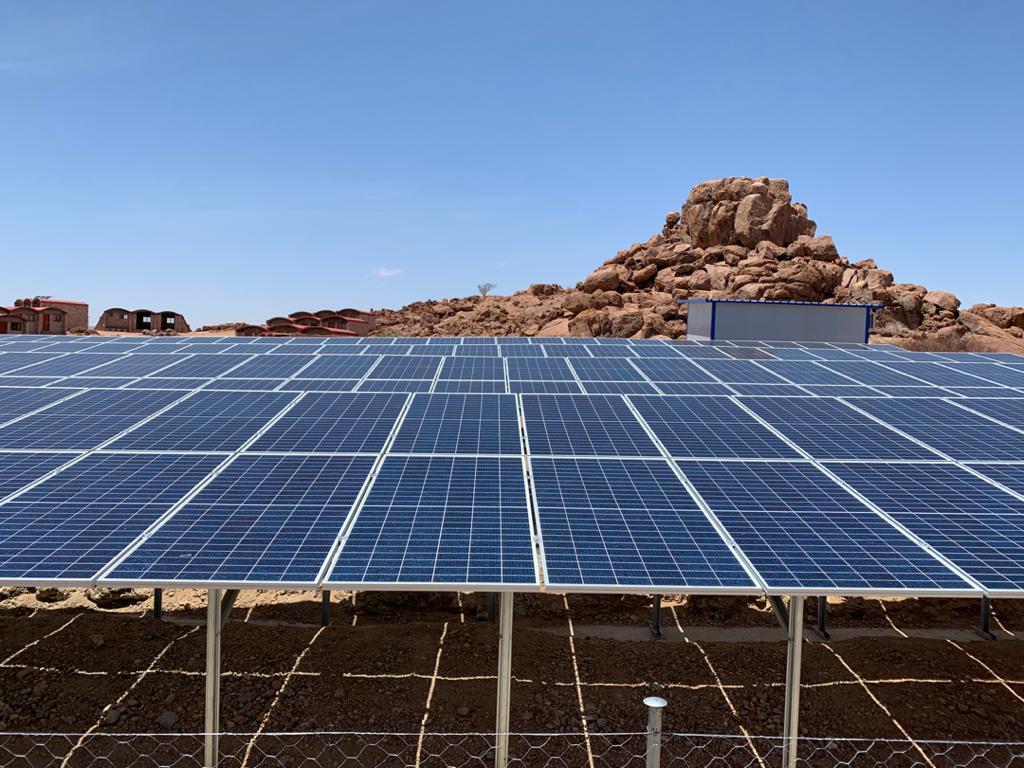Sorris-Sorris gets solar power
In a step towards climate adaptation, the Sorris-Sorris Conservancy in the Kunene Region recently received a 150-kilowatt solar power plant that will benefit 9 200 people.
The solar plant was funded by the Environmental Investment Fund (EIF) and created 25 jobs.
Speaking at the handover ceremony, environment minister Pohamba Shifeta said the power plant would greatly contribute to reaching the ministry's renewable-energy targets.
According to Shifeta four local women are being trained in solar plant operation, maintenance and administration.
“The increased use of renewable energy such as solar off-grid technologies will not only cushion us from the adverse effects of climate change, but also act as a catalyst for enhancing rural development through the promotion of better conditions for women to access better education and health services, improved access to information, improved productivity and new employment opportunities,” Shifeta said.
He said the project demonstrated the conservancy's unity, commitment and hard work.
In developing countries such as Namibia, a significant percentage of the population do not have electricity, let alone the use of green technology to curb emissions, he added.
“I have seen and experienced the struggle and drudgery of most of our community-based organisations in the absence of basic energy service facilities.”
He said some of the most promising community-based establishments, especially those in very remote corners of the country, had closed down because of the high cost of diesel for electricity generation.
He added that the Kunene Region has been prone to severe droughts and climate variability for the past eight years.
“Additionally, the region's topography does not serve as a conducive environment for crop production. The vulnerability of the communities in this region is further exacerbated especially because of the increased vulnerability by the rural communities living in these isolated settlements.”
Shifeta commended the Green Climate Fund board for approving the N$130 million project funding proposal under the Empower to Adapt (EDA) project in October 2016.
According to him the EDA project has two distinguishing features that set it apart from traditional funding approaches.
Firstly, through EDA, the GCF aims to devolve decision-making to direct-access entities such as the EIF nationally.
Secondly, the EDA allows for the delivery of funding directly to community-level entities.
“This mode of funding ensures strong country ownership and multi-stakeholder engagement including civil society.”
He said this is achieved under the auspices of the environment ministry. He added that this guarantees that the funding will be exclusively and directly channelled to communal conservancies and community forests.
The minister said this funding was one of the first grants that the GCF has awarded under the EDA modality globally and the world would be keen to learn from Namibia's successes and mistakes.
ELLANIE SMIT
The solar plant was funded by the Environmental Investment Fund (EIF) and created 25 jobs.
Speaking at the handover ceremony, environment minister Pohamba Shifeta said the power plant would greatly contribute to reaching the ministry's renewable-energy targets.
According to Shifeta four local women are being trained in solar plant operation, maintenance and administration.
“The increased use of renewable energy such as solar off-grid technologies will not only cushion us from the adverse effects of climate change, but also act as a catalyst for enhancing rural development through the promotion of better conditions for women to access better education and health services, improved access to information, improved productivity and new employment opportunities,” Shifeta said.
He said the project demonstrated the conservancy's unity, commitment and hard work.
In developing countries such as Namibia, a significant percentage of the population do not have electricity, let alone the use of green technology to curb emissions, he added.
“I have seen and experienced the struggle and drudgery of most of our community-based organisations in the absence of basic energy service facilities.”
He said some of the most promising community-based establishments, especially those in very remote corners of the country, had closed down because of the high cost of diesel for electricity generation.
He added that the Kunene Region has been prone to severe droughts and climate variability for the past eight years.
“Additionally, the region's topography does not serve as a conducive environment for crop production. The vulnerability of the communities in this region is further exacerbated especially because of the increased vulnerability by the rural communities living in these isolated settlements.”
Shifeta commended the Green Climate Fund board for approving the N$130 million project funding proposal under the Empower to Adapt (EDA) project in October 2016.
According to him the EDA project has two distinguishing features that set it apart from traditional funding approaches.
Firstly, through EDA, the GCF aims to devolve decision-making to direct-access entities such as the EIF nationally.
Secondly, the EDA allows for the delivery of funding directly to community-level entities.
“This mode of funding ensures strong country ownership and multi-stakeholder engagement including civil society.”
He said this is achieved under the auspices of the environment ministry. He added that this guarantees that the funding will be exclusively and directly channelled to communal conservancies and community forests.
The minister said this funding was one of the first grants that the GCF has awarded under the EDA modality globally and the world would be keen to learn from Namibia's successes and mistakes.
ELLANIE SMIT





Comments
Namibian Sun
No comments have been left on this article